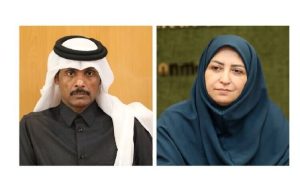Qatar ready to cooperate with Iran to address SDSs
TEHRAN – Qatar’s newly appointed ambassador in Tehran Saad bin Abdullah Al-Mohammad Al-Sharif has announced that his country is completely prepared to collaborate with Iran in the fight against sand and dust storms (SDSs). Highlighting the friendly relationship between the two countries, the Qatari official said, “Qatar pays great attention to environmental issues. In this


TEHRAN – Qatar’s newly appointed ambassador in Tehran Saad bin Abdullah Al-Mohammad Al-Sharif has announced that his country is completely prepared to collaborate with Iran in the fight against sand and dust storms (SDSs).
Highlighting the friendly relationship between the two countries, the Qatari official said, “Qatar pays great attention to environmental issues. In this regard, we are fully prepared to cooperate with Iran to combat sand and dust storms, and we would also like to receive Tehran’s proposals on managing this phenomenon.”
He made the remarks during a meeting with the head of the department of environment Shina Ansari on Sunday in Tehran, IRNA reported.
Ansari, for her part, expressed Iran’s interest in fostering environmental collaborations, sharing expertise and experiences with Qatar.
The official went on to say that dust is one of the most important environmental issues in Iran which has also impacted the region for a long time and has had numerous environmental impacts on several provinces. Regional cooperation is needed to manage the problem.
Highlighting the geographical proximity, and close relationships of the two countries, the official said that Qatar is a member state of the Regional Organization for the Protection of the Marine Environment (ROPME) which further underscores the significance of the two countries’ cooperation.
Referring to marine ecosystems, Ansari said the capabilities of the ROPME have been neglected. “We expect this environmental convention among Persian Gulf states to take effect.”
“We are also interested in boosting cooperation around the ROPME convention and utilizing its capacities to solve the environmental issues of the Persian Gulf,” Ansari noted.
Combating SDSs
In the Iranian year 1397 (2018-2019), the national headquarters for dealing with sand and dust storms (SDSs) took action to identify the internal and external sources of SDSs and subsequently implemented action plans including the assessment of dust damages, establishment of notification guidelines, and other software tasks.
In 2022, Iran started consulting neighboring countries, and the head of the Department of Environment paid visits to Iraq, Syria, Qatar, Kuwait, and the UAE.
In July 2022, Tehran played host to a conference of ministers and officials from 11 countries, aiming to boost cooperation for resolving extant environmental problems, especially sand and dust storms.
Environment ministers of Iraq, Armenia, the United Arab Emirates, Oman, Syria, and Qatar, as well as deputy ministers of Azerbaijan and Turkmenistan along with delegations from Turkey and Uzbekistan, participated in the event which was held with the theme of “Environmental Cooperation for a Better Future.”
Late President Ebrahim Raisi proposed the creation of a regional fund to deal with SDSs which was submitted to the United Nations later.
The International Conference on SDSs was held in Tehran on September 9-10, 2023, representatives of some 50 countries and 15 international organizations attended the conference.
The event was a further step towards the implementation of Iran’s environmental protection policies.
Moreover, the 6th United Nations Environment Assembly (UNEA-6) approved a resolution adopted at the international summit on dealing with sand and dust storms.
The UNEA-6 was held from February 26 to March 1 at the United Nations Environment Program (UNEP) headquarters in Nairobi, Kenya. It is the world’s highest decision-making body on the environment.
ROPME
ROPME was established in Kuwait in early 1979 and was quickly ratified by seven member states (Iran, Bahrain, Iraq, Oman, Qatar, Saudi Arabia, and the United Arab Emirates).
The main objective of ROPME is to coordinate efforts of the eight Member States towards protecting the marine and coastal environment and ecosystems in the ROPME Sea Area against marine pollution and stressors that might be induced by developmental activities or/and other drivers of change.
MT/MG
